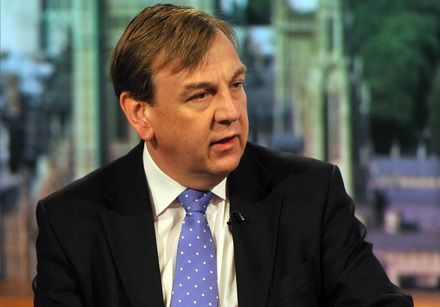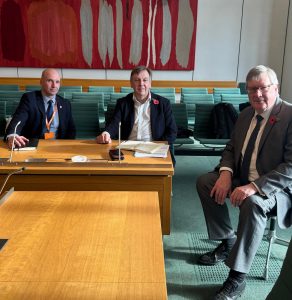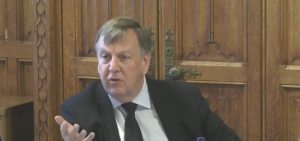
“Evropeiska Pravda” met with John Whittingdale at a panel discussion focusing on Ukraine which took place this Tuesday at the House of Commons. Being Chairman of the British-Ukraine All-Party Parliamentary Group, Mr Whittingdale co-organised that panel discussion. He was very open and honest in this interview taken just before the start of the event.
While some of Mr Whittingdale’s comments might not be received well by many readers in Ukraine, his views apparently reflect the general mood among pro-Ukrainian politicians in the EU, and particularly in London. For instance, he stated Ukrainians should not expect liberalisation of the visa regime with the UK in the foreseeable future.
We also discussed the conflict between Russia and Ukraine. While Mr Whittingdale admitted that Russian army invaded Ukraine and called the pro-Russian militants ‘terrorists’, he also noted that ‘Kyiv should not expect significant military support from the West.’
‘It is not only a war against terrorists, but also against Russia’
– We all heard European politicians, as well as the President of Ukraine, saying there couldn’t be a military resolution to the conflict in Donbas. In your opinion, were those statements somewhat premature?
– We have to be realistic. In case a full-scale military conflict between Russia and Ukraine happens
– Russia will come out on top. So the military option is not the best one indeed.
This doesn’t mean we shouldn’t provide military assistance to Ukraine’s armed forces, especially considering the losses they have encountered. But your country shouldn’t expect that such assistance will help you resolve the conflict by military means.
A dialogue is required to find a way out of this conflict, and this is what is happening now.
– But wait, there is also the view that we already have a war, even if it has not been declared. So we are, in fact, already in the middle of a military conflict.
– I agree with this.
It is not only a war with terrorists supported by Russia. It is absolutely clear that an invasion of Russia’s regular army to Ukraine has taken place. But look what happened as the result of this invasion [in August]. Ukraine’s army took a big hit and suffered serious losses.
So it is apparent now, that a solution to the conflict should not lead to another wave of Russian military invasion to Ukraine. I am very suspicious as to the intentions of President Putin and Russia. However we cannot escape geography.
Russia is a powerful state bordering Ukraine, while the Western Europe and United Stated are far away.
We are ready to support the right of Ukrainian citizens to determine their own future. By the way, the results of the elections confirmed that Ukrainian people want closer relations with the EU. However we are left with no other option but to persuade Russia that this is a true choice of the people of Ukraine, and that this does not pose a threat to Russia.
– What makes you think such a dialogue will yield results? Russia did not demonstrate its willingness to compromise up until this point.
– We shouldn’t underestimate the influence of sanctions. They already work, and will have an even bigger impact with time. Russian economy will most likely grow negatively this year. Look at Russia’s capital markets and devaluation of its currency – all of this influences Russia’s stance. My personal view is that these sanctions should be expanded. The West should demonstrate it is able to do more if Russia refuses to honour the arrangements achieved in Minsk.
– However an opposite option is being discussed now, which is to reduce sanctions. Do you feel it is possible that, when the sectorial economic sanctions end next spring, the EU might be unable to agree on their extension? In such case, the toughest sanctions would be removed.
– I am convinced we mustn’t reduce the sanctions in case Russia does not fulfil its obligations [according to the Minsk agreements], including releasing hostages and withdrawing its troops from Ukraine. Otherwise, the sanctions should be extended in full.
Moreover, Russia has to withdraw not only from the Eastern Ukraine, but from Crimea as well. Crimea is a part of Ukraine’s territory which is currently being occupied. And as long as Russia continues occupying Crimea, the West must send a clear message that it is unacceptable.
– Let’s return to the subject of military assistance. Why not give Kremlin a clear signal by supplying Ukraine with lethal weapons? Even if such assistance is merely symbolic, it would indicate that the West is ready to support Kyiv.
– 10 days ago, I put the same question before the Secretary of State for Defence. His answer was that the military way of resolving the conflict would not be a step forward.
My personal opinion though is that we should supply Ukraine not only with non-lethal weapons, but also with military defence equipment. By strengthening Ukraine’s army, we would also send a clear signal to Russia. That said, I would like to reiterate again that we should not focus on the military way out of the crisis.
– Are there any circumstances under which the West might reconsider its positon? How far Putin has to go before military assistance is considered?
– No one knows what will happen in the future. However I can assure you that any further invasion by Russia will bring about new sanctions against it. There are many more political and economic steps which can be taken. For instance, there could be tougher sanctions against Russian banks. A certain degree of military assistance to Ukraine is also possible.
However, should such assistance happen, it would be merely symbolic. It would certainly not reach a level which would enable Ukraine to consider a military resolution to the conflict. No one wants to see a full-scale military conflict between Russia and Ukraine. Moreover, we do not want to be drawn into this conflict.
‘There won’t be a visa-free regime with Ukraine in the foreseeable future’
– I can’t avoid the question of British visa policies in relation to Ukraine. While other EU and Schengen states relieve their policies towards visitors from Ukraine, the UK does the opposite. Currently, there is even no British visa office in our country. In your opinion, is it possible that this policy will change?
– I ask you to understand that what you are talking about is not directed specifically against Ukraine. This is a part of British internal policies. Immigration is perhaps the biggest problem we are facing now. Our country is seriously concerned with the number of people coming from abroad – we simply cannot accommodate all of them.
The British government is currently under political pressure to tighten its immigration policies, and this is related not only to Ukraine or Russia. This is a general policy.
Ukraine is a rather large country. Your population is only marginally lower than ours. Therefore it is very unlikely that the idea of relieving immigration policies towards Ukraine would be supported by voters across the UK.
Personally, I would like to see the process of granting visas to Ukrainians being simplified. I know about problems that occur. My Ukrainian friend who has a family in London and holds a major position in the City invited her mother, who visited London many times, to come to the UK and see her grandchildren.
Apparently, that woman had no intentions of becoming an illegal immigrant. She had never violated visa regulations. But she was suddenly refused a visa this time. Definitely, Ukrainians struggle to understand such cases.
However, I am an elected politician, and I cannot ignore the fact that the voters whom I represent are deeply concerned with the level of immigration, and that they stand against relieving visa policies towards such a large country as Ukraine. Therefore politically it is not possible.
Of course we have to deal with such cases which I have described. We have to take a more individual approach. We have to be more forthcoming to visa applicants who, apparently, do not intend to immigrate to the UK, but rather want to visit our country or their relatives which live here. However there won’t be a visa-free regime with Ukraine in the foreseeable future.
‘It is very positive that the Opposition Block will have a considerable representation in the Parliament’
– Have your expectations with regards to the future of Ukraine changed following the recent elections?
– Yes, of course. I visited Kyiv a month ago, and met with representatives of a number of political parties. I was impressed that the majority of the parties which were successful in the elections – be it the parties of Poroshenko, Yatsenyuk, or the Self-Reliance party – include a number of people who never actually thought of participating in elections before.
Those people used to think that it was pointless, that nothing could be changed. And it is very positive that such people coming to the Parliament from the civic society, or even from self-defence units, are now seeing sense in getting involved in politics.
The new Rada will be largely different from the previous one, and this brings a sense of optimism.
– Do you really see commanders of self-defence units coming to the Parliament as a positive step? It is unlikely that they are experts in implementing reforms.
– Nevertheless, a part of the newcomers possess considerably deep knowledge with regards to reforms. There are even those who have already been supporting reforms outside of the Parliament. So their arrival is a definite positive. And I would think that, following these elections, Ukraine will have better chances for Rada passing the constitutional reform, as well as other political and economic reforms which are long overdue.
– Do you expect a significant change in the composition of Ukrainian government following the elections?
– I wouldn’t want to tell Ukraine’s authorities what they have to do. Ukraine itself has to give this answer.
That said, I believe that the coalition between Poroshenko and Yatsenyuk has very high chances to remain.
The new government has to include people with political experience, such as Arseniy Yatsenyuk. But I would also like to stress the importance of bringing in new faces – young people able to inject a new impulse. There are many activists with impressive potential to work in a new coalition government.
– The elections have not been held in Crimea and a large number of constituencies of Donbas. Doesn’t this question the legitimacy of the elections?
– But that is not the fault of the government of Ukraine! Here in Europe, we understand that the Central Electoral Commission has been committed to organising elections in as many constituencies of Donbas as possible. It is obvious that elections were impossible in those regions which are not under control of the government.
I should also note that it is very positive that the Opposition Block will have a considerable representation in the Parliament.
I believe that strong opposition is an important part of a democratic society. I met with representatives of the Opposition Block, and see them as a good opposition.
Moreover, I believe it is not in the interests of Ukraine to have a government consisting only of representatives of the Centre and West of the country, without politicians representing the East of Ukraine.
By Sergiy Sydorenko, “Evropeiska Pravda”


